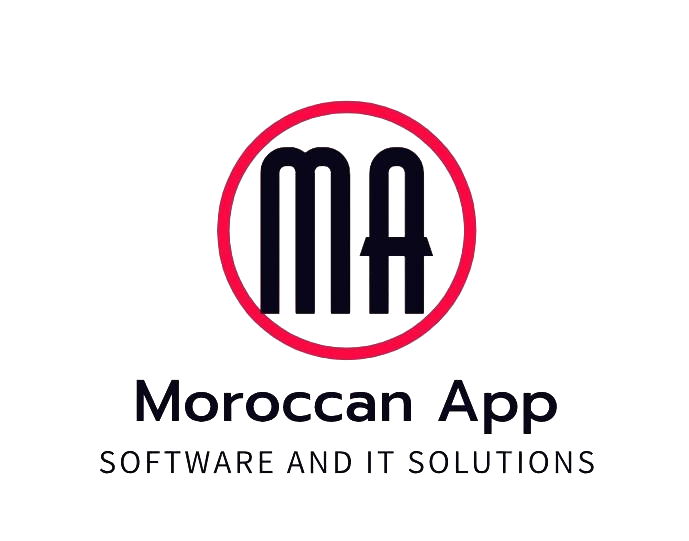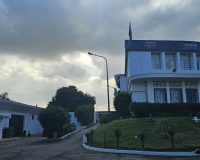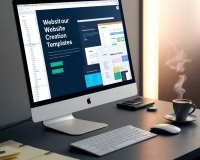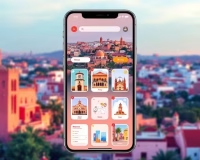- Mon - Sat 8:00 - 17:30, Sunday - CLOSED
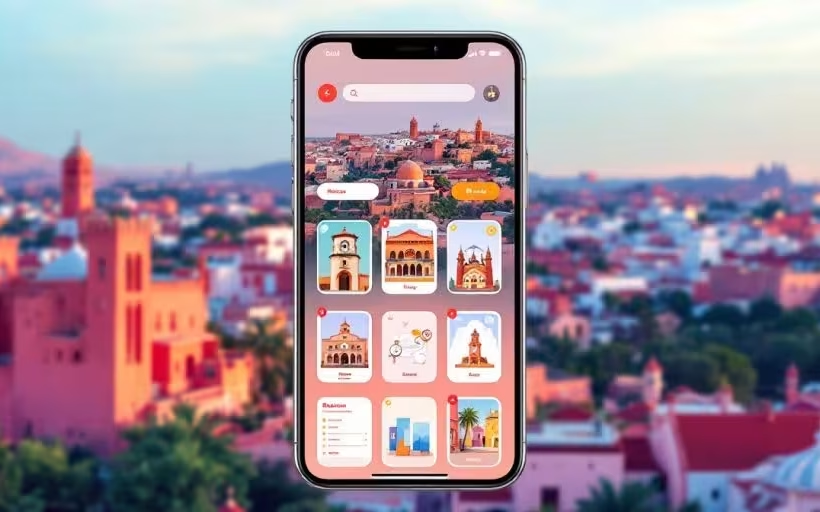
How to Create a Mobile Application in Morocco: Key Steps
Creating a mobile application in Morocco may seem complicated, but by following the right steps, it becomes easier. This article will guide you through the essential steps to develop a successful application that meets the needs of users and the market. Key Points to Remember Understanding user needs is essential for designing an effective application. The UX/UI design must be intuitive to ensure a good user experience. The choice of development technologies influences the application’s performance. Testing the application before deployment allows for correcting errors and improving quality. Continuous maintenance is crucial to ensure that the application remains functional and relevant. Application Analysis and Design Understanding User Needs To create an effective mobile application, it is essential to understand user needs. This starts with market research to identify the problems your application can solve. Here are some questions to consider: Who are your target users? What problems are they currently facing? How can your application improve their daily lives? Drafting the Specifications Once the needs are identified, it is crucial to write a specification document. This document should include: The essential features of the application. The technical and aesthetic requirements. A development timeline. Project Planning Planning is a key step to ensure the success of your application. Here are some steps to follow: Establish a development schedule. Involve all stakeholders in the project. Plan for technical adjustments before launch. Careful planning helps meet deadlines and optimize resources. By following these steps, you will be able to create an application that meets user expectations and stands out in the market. Boost your SME’s digital presence in Morocco with mobile applications: visibility, engagement, and guaranteed growth. UX/UI Design for an Optimal Experience Creating Intuitive Mockups To design a successful mobile application, it is essential to create intuitive mockups. These mockups allow you to visualize the application before its development. Here are some key steps: Initial sketch: Draw a sketch of the application to define its organization. Low-fidelity mockup: Create a simplified version to test navigation ideas. High-fidelity mockup: Develop a detailed version with graphical elements and interactions. Ergonomics and Simplified Navigation Ergonomics is crucial to ensure smooth navigation. Here are some principles to follow: Simplicity: Avoid unnecessary elements that can distract the user. Consistency: Use similar design elements throughout the application. Accessibility: Ensure that the application is usable by everyone, including people with disabilities. User Testing and Feedback User testing is essential to improve the experience. It allows for gathering valuable feedback. Here’s how to proceed: Organize testing sessions: Invite users to test the application in a controlled environment. Collect data: Note user behaviors and comments. Make adjustments: Use feedback to fix issues and improve the interface. In summary, UX/UI design is an iterative process that requires constant testing and adjustments to provide an optimal user experience. The goal is to make the application enjoyable and easy to use. Development and Technical Integration Choosing Technologies and Platforms The choice of technologies is crucial for the success of your application. It is essential to select the right platforms to reach your target audience. Here are some popular options: iOS: Uses Swift, ideal for Apple users. Android: Uses Kotlin, reaching a broader audience. Cross-platform: Technologies like React Native allow for development across multiple systems with a single codebase. Developing Features Development should be done in an agile manner, allowing for quick adjustments. Here are the key steps: Feature planning: Define what the application should do. Iterative development: Create successive versions to test and improve. System integration: Ensure that the application works well with other existing systems. Integration with Existing Systems Integration is essential to ensure that your application works well with other tools. This may include: APIs: To connect your application to other services. Databases: To store and manage user data. Payment systems: To facilitate online transactions. In summary, developing a mobile application in Morocco requires careful planning and a good understanding of available technologies. This allows for creating an application that meets user needs and is suited to the local market. Our agency, an expert in mobile application development in Morocco, offers innovative solutions tailored to your needs. Testing and Quality Assurance Functional and Technical Testing Functional and technical testing are essential to ensure that your application works as intended. It is crucial to verify each feature to ensure it meets user needs. Here are some steps to follow: Define test cases based on requirements. Execute tests in a controlled environment. Document results and anomalies. Bug Resolution and Improvements Once testing is complete, it’s time to resolve identified bugs. This may include: Prioritizing bugs based on their impact on the user. Implementing temporary solutions if necessary. Retesting after fixes to ensure everything works. Final Validation and Deployment Preparation Before launching your application, a final validation is necessary. This involves: Conducting beta tests with real users to gather feedback. Ensuring all features are operational. Preparing documentation for deployment. In conclusion, testing and quality assurance are essential steps to ensure the success of your mobile application. By following these steps, you ensure that your product is ready to be launched in the market. Don’t forget that choosing a mobile application development agency in Morocco can also influence the quality of your final product. Deployment and Ongoing Maintenance Publishing on Stores Once your application is ready and the feedback from the beta version is positive, it’s time to publish it on the stores. With your developer account, you can submit your application on iOS and Android platforms. After submission, wait for approval for it to be available for download. During this wait, it’s wise to start promoting your application on social media. Here are some strategies to consider: Create presentation videos. Share attractive screenshots. Offer launch promotions to entice early users. Monitoring Performance and Updates Once the application is online, the work doesn’t stop there. It is crucial to monitor the performance of your application. This includes analyzing usage data and reading user feedback. Here are some actions to take: Analyze usage statistics. Identify and fix reported bugs. Plan regular updates to improve user experience. Technical Support and Future
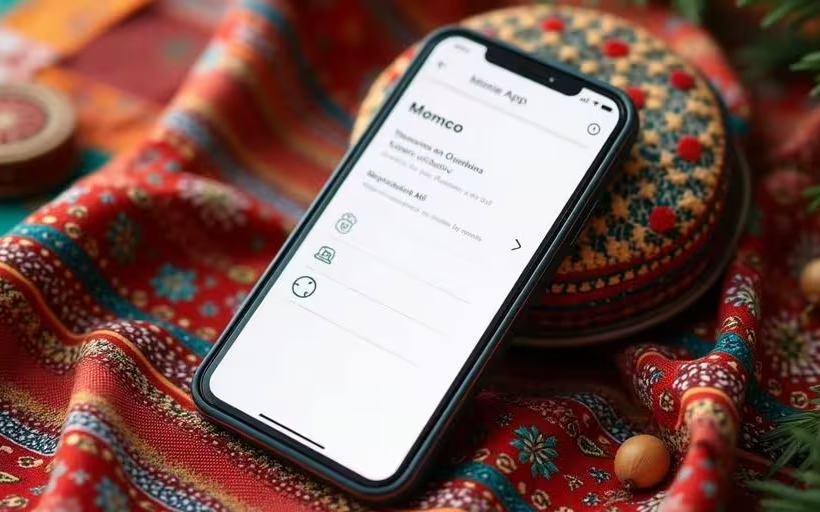
Why develop a mobile application for your business in Morocco?
In an increasingly digital world, developing a mobile application for your business in Morocco may seem essential. This approach offers numerous benefits, ranging from improving customer relationships to better visibility for your brand. In this article, we will explore the reasons why investing in a mobile application is a wise decision for Moroccan businesses. Key Points Mobile applications strengthen customer relationships by facilitating communication. They increase your brand’s visibility among users. A mobile application helps retain customers through exclusive offers. Working with a specialized agency allows for professional and rapid development. The Moroccan market offers competitive development costs and local talent. Benefits of a Mobile Application for Moroccan Businesses Improvement of Customer Relationships Mobile applications allow Moroccan businesses to enhance their digital presence. Through direct communication, businesses can better understand their customers’ needs and offer personalized services. This creates a stronger bond and improves customer satisfaction. Increased Brand Visibility A mobile application ensures constant visibility of the brand on users’ smartphones. This facilitates access to products and services, allowing businesses to stand out in a competitive market. Being always within reach, customers are more likely to interact with the brand. Customer Loyalty Applications offer exclusive benefits, such as promotions and rewards, that encourage customers to return. By providing features such as loyalty programs, businesses can increase customer engagement and encourage repeat purchases. In summary, having a mobile application has become essential for Moroccan businesses looking to grow and adapt to new consumer expectations. Benefits Description Customer Relationship Direct and personalized communication Visibility Constant presence on smartphones Loyalty Promotions and rewards for loyal customers Why Choose a Specialized Agency in Morocco Technical and Professional Expertise Engaging a smartphone application development agency in Morocco ensures a high level of expertise. The professionals at these agencies possess varied skills, ranging from development to graphic design. This guarantees that your application will not only be functional but also appealing to users. Comprehensive and Strategic Approach A specialized agency adopts a comprehensive approach to the development of your application. This means that it takes into account your business objectives, analyzes the market, and studies your competitors. This strategy allows for the creation of an application that truly meets your customers’ needs. Time Savings and Cost Reduction Outsourcing the development of your mobile application can save you valuable time. By entrusting this project to experts, you can focus on your core business. Moreover, development costs in Morocco are often more competitive than in other countries, allowing you to save while benefiting from quality service. By choosing a specialized agency, you ensure that you have an application that meets market standards while respecting your budget. Summary of Benefits Expertise: Team of qualified professionals. Strategy: In-depth analysis of the market and needs. Economy: Reduced development costs. In conclusion, opting for a specialized agency in Morocco for the development of your mobile application is a wise choice that can propel your business towards success. Key Steps in Developing a Mobile Application The development of a mobile application is a process that takes place in several essential steps. Each step is crucial to ensure the success of the application. Here are the main steps to follow: Defining Objectives and Design Needs analysis: Before starting, it is important to understand what the application should do and how it should function. This includes defining features and user expectations. Specifications document: A document detailing all technical and functional specifications is created. This document is essential to ensure that all stakeholders are aligned on the project. Mockups: Creating mockups allows for visualizing the user interface before development. This helps refine the design and user experience. Development and Programming Agile approach: Using an agile method allows for working in iterations, making adjustments easier during development. Technologies: Choosing the right technologies (native or hybrid) based on the specific needs of the application is crucial. Collaboration: Working closely with developers to ensure that the final product meets expectations. Testing and Improvements Rigorous testing: Before launch, it is essential to test the application on different devices to detect and correct bugs. Optimization: Improving performance and compatibility with different operating system versions is a key step. Submission to stores: Once testing is validated, the application is submitted to download platforms like Google Play and Apple App Store. By following these steps, you ensure that your mobile application is well-designed, functional, and ready to meet your users’ needs. Impact of the Moroccan Market on Application Development Development Costs in Morocco The cost of developing a mobile application in Morocco is often lower than in Europe. This attracts many companies looking to optimize their expenses while benefiting from quality service. Here are some key points to consider: Costs can range from 40,000 MAD to over 1,000,000 MAD depending on the complexity of the application. Moroccan companies can save up to 30% compared to European rates. The local market offers a qualified workforce at competitive rates. Local Opportunities and Challenges The Moroccan market presents interesting opportunities for application development, but there are also challenges to overcome: Rapid growth: The mobile application sector is booming. Increased competition: More and more development agencies are emerging. Adaptation to local needs: Applications must meet the cultural and economic specificities of the country. Regional Particularities Regional particularities also influence application development in Morocco. Here are some elements to consider: Language and cultural differences can affect the user interface. Technological infrastructures vary from region to region, impacting connectivity and access to services. Local regulations may impose additional constraints on developers. In summary, the Moroccan market offers a dynamic environment for mobile application development, but it is essential to understand the associated costs and challenges to succeed in this sector. Current Trends in Mobile Application Development Adoption of UX/UI Design UX/UI design has become essential for attracting and retaining users. A well-designed interface enhances the user experience and increases satisfaction. Moroccan companies must focus on intuitive and aesthetic designs to stand out. Preference for Native or Hybrid Development Companies are increasingly choosing between native and hybrid development. Native development offers optimal performance, while hybrid development allows for cost reduction. Here is a comparative table: Type of

RFID Technology in Morocco: Applications and Innovations
RFID Technology (Radio Frequency Identification) is gaining popularity in Morocco. It is a game-changer in industry and commerce, offering innovative solutions that make operations more efficient. It also helps with better stock management and tracking assets and the supply chain. Moroccan businesses are using these advancements to modernize and become more competitive. RFID technology is used in logistics and inventory management, and it also enhances the customer experience in stores. It is transforming the way products are tracked and controlled. The integration of RFID with the Internet of Things (IoT) and cloud solutions is opening new doors. This allows Moroccan companies to engage in innovation and digital transformation. Key Takeaways Current State of RFID Technology in Morocco Morocco is becoming a leader in the use of RFID technology. This revolutionary technology enhances efficiency and customer experience across multiple sectors. The implementation of RFID is becoming increasingly common. Adoption Across Different Sectors RFID technology is becoming more popular in Morocco. It is used in: Existing Technological Infrastructure Morocco has a developing RFID infrastructure, which includes: Key Market Players The Moroccan RFID market is driven by several key players, including: Companies Areas of Expertise Company X Design of RFID systems for logistics and traceability Company Y Integration of RFID solutions into enterprise information systems Company Z Manufacturing and distribution of RFID tags and readers tailored to local needs These smart technology solutions in Morocco based on RFID technology open new perspectives. They are gradually transforming practices in many sectors. Industrial and Logistics Applications RFID technology is very useful in industry and logistics in Morocco. It helps better manage inventory, track products, and improve production. RFID in Logistics and Supply Chain RFID in logistics and supply chain makes goods more visible. Companies in Morocco can better control their inventories. This reduces errors and improves stock management. RFID in the Manufacturing Sector In the manufacturing sector, RFID is essential. It automates production and tracks assets in real time. This optimizes processes, reduces downtime, and improves quality. Advantages of RFID in Industry Application Examples Product traceabilityOptimized inventory managementProcess automationError reductionQuality improvement Tracking shipments and deliveriesAsset and equipment managementProduct quality controlProduction line optimizationSecuring storage areas Companies in Morocco are increasingly using RFID. They aim to be more efficient, productive, and competitive in the market. “RFID has transformed our supply chain, allowing us to accurately track our products and respond quickly to customer demands.” – CEO, Automotive Manufacturing Company RFID in Moroccan Retail RFID technology is crucial for the digital transformation of retail in Morocco. It helps manage inventory, improve customer experience, and prevent losses. Moroccan retailers are increasingly adopting it. Inventory Management Solutions RFID tags and readers allow merchants to track their inventory in real time. This optimizes shelf management. Increased visibility reduces stockouts and improves item turnover. Enhanced Customer Experience Using RFID technology makes shopping smoother. Customers benefit from a personalized experience. Features like automatic item detection at checkout make purchasing easier. Loss Prevention RFID allows precise tracking of inventory and movements. This helps prevent theft and restocking errors. The technology optimizes margins and improves profitability. RFID solutions offer many advantages to retailers in Morocco. They transform the shopping experience and improve inventory management and profitability. Digital Transformation of Moroccan Businesses Digital transformation in Morocco is advancing rapidly. Companies are adopting RFID technology to boost their digitalization. This technology enhances efficiency, decision-making, and innovation. RFID helps Moroccan companies automate their operations. This reduces errors and optimizes stock management. Leaders can make informed decisions thanks to real-time data. RFID also paves the way for innovation. It enables the development of traceability solutions and improves customer experience. It’s a major asset for the digital transformation of Moroccan companies. “RFID is a key element of digital transformation, enabling companies to increase their efficiency and competitiveness.” Morocco is engaging in its digital transformation. RFID technology is essential for the digital transformation of businesses. It offers numerous strategic and operational advantages. Traceability and Real-Time Tracking Solutions RFID tracking solutions are changing asset management for Moroccan companies. They enable real-time tracking of key elements, improving quality control and helping to make better decisions. Asset Tracking Systems RFID asset tracking systems help locate and monitor equipment and resources. This reduces losses and improves asset utilization. Supply Chain Management Using RFID technology in the supply chain ensures perfect traceability. It enhances forecasting, inventory management, and logistics flow coordination. Quality Control RFID tracking solutions allow for real-time monitoring of product quality. This helps identify and quickly address issues, ensuring product quality. “RFID technology has revolutionized how we manage our assets and supply chain. We’ve significantly improved our operational efficiency and customer satisfaction.” – Operations Manager, Moroccan Logistics Company Security and Authentication with RFID RFID technology is crucial for security and authentication in Morocco. It helps combat counterfeiting and secures access to locations. Additionally, it protects official documents. Counterfeit Protection RFID enables automated tracking of products, preventing the circulation of counterfeit goods. This technology is widely used in luxury and electronics sectors to protect brands. Secure Access Control RFID authentication systems are common for access control. They are used in businesses and government buildings. RFID badges quickly identify authorized individuals and block unauthorized access. Securing Official Documents RFID also secures identity documents and passports. RFID chips instantly verify the authenticity of these documents, reducing the risk of forgery. RFID technology enhances security and authentication across various fields in Morocco. It is seen as a promising emerging technology. Recent Innovations and Developments The Moroccan RFID technology market is booming, with numerous innovations transforming industries. These advancements are paving the way for exciting new applications. Moroccan companies are exploring the latest advancements, aiming to improve efficiency, traceability, and customer experience through integration with the Internet of Things (IoT) and cloud computing. New Applications RFID is increasingly used in sectors like healthcare, agriculture, and transportation. For example, RFID bracelets monitor patients’ health in real time, while RFID sensors enhance crop production and traceability in agriculture. IoT Integration Cloud Solutions Moroccan companies are adopting cloud-based RFID solutions, benefiting
